
The New Zealand national rugby union team, commonly known as the All Blacks, represents New Zealand in men's international rugby union, which is considered the country's national sport. Famed for their international success, the All Blacks have often been regarded as one of the most successful sports teams in history.
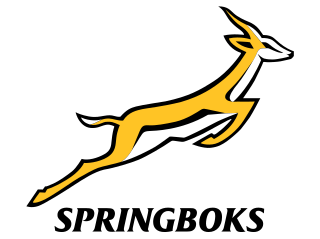
The South Africa national rugby union team commonly known as the Springboks, is the country's national team governed by the South African Rugby Union. The Springboks play in green and gold jerseys with white shorts. Their emblem is a native antelope, the Springbok, which is the national animal of South Africa. The team has been representing South African Rugby Union in international rugby union since 30 July 1891, when they played their first test match against a British Isles touring team. They are currently the number one ranked rugby team in the world and the reigning World Champions, having won the World Cup on a record four occasions. They are also the second nation to win the World Cup consecutively, and stand second to their rivals the All Blacks in terms of success in international rugby.

The Australia national rugby union team, nicknamed the Wallabies, is the representative national team in the sport of rugby union for the nation of Australia. The team first played at Sydney in 1899, winning their first test match against the touring British Isles team.
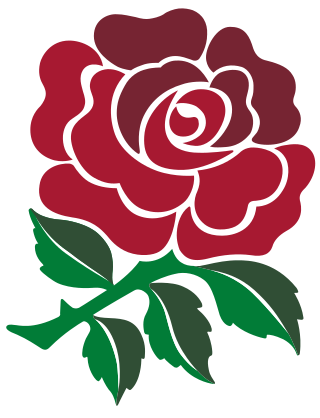
The England men's national rugby union team represents the Rugby Football Union in men's international rugby union. They compete in the annual Six Nations Championship with France, Ireland, Italy, Scotland and Wales. England have won the championship on 29 occasions, winning the Grand Slam 14 times and the Triple Crown 26 times, making them the most successful outright winners in the tournament's history. They are currently the only team from the Northern Hemisphere to win the Rugby World Cup, having won the tournament in 2003, and have been runners-up on three further occasions.

The Wales national rugby union team represents the Welsh Rugby Union in men's international rugby union. Its governing body, the Welsh Rugby Union (WRU), was established in 1881, the same year that Wales played their first international against England. The team plays its home matches at the Millennium Stadium in Cardiff, which replaced Cardiff Arms Park as the national stadium of Wales in 1999.

The Great Britain national rugby league team represents Great Britain in rugby league. Administered by the Rugby Football League (RFL), the team is nicknamed The Lions.
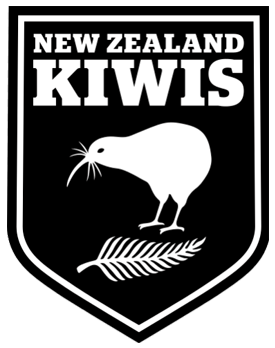
The New Zealand national rugby league team has represented New Zealand in rugby league since 1907. Administered by the New Zealand Rugby League, they are commonly known as the Kiwis, after the native bird of that name. The team's colours are black and white, with the dominant colour being black, and the players perform a haka before every match they play as a challenge to their opponents. The New Zealand Kiwis are currently second in the IRL World Rankings. Since the 1980s, most New Zealand representatives have been based overseas, in the professional National Rugby League and Super League competitions. Before that, players were selected entirely from clubs in domestic New Zealand leagues.
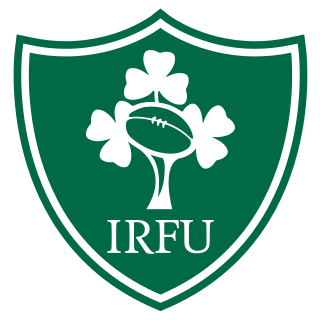
The Ireland national rugby union team is the men's representative national team for the island of Ireland in rugby union. The team represents both the Republic of Ireland and Northern Ireland. Ireland competes in the annual Six Nations Championship and in the Rugby World Cup. Ireland is one of the four unions that make up the British & Irish Lions – players eligible to play for Ireland are also eligible for the Lions.
The France national rugby union team represents the French Rugby Federation in men's international rugby union matches. Colloquially known as Le XV de France, the team traditionally wears blue shirts with a Gallic rooster embroidered on the chest, white shorts and red socks in reference to the French national flag. Les Bleus mostly play home matches at the Stade de France in Saint-Denis, near Paris. They compete in the annual Six Nations Championship along with England, Ireland, Italy, Scotland and Wales. France have won the tournament on 26 occasions, winning the Grand Slam 10 times.

The Fiji national rugby union team represents Fiji in men's international rugby union. Fiji competed in the Pacific Tri-Nations and now competes in its successor tournament Pacific Nations Cup. Fiji also regularly plays test matches during the June and November test windows. They have beaten the major rugby playing sides of Wales, Scotland, Australia, France, Italy, Argentina and England. The only major sides Fiji are yet to beat are New Zealand, South Africa and Ireland.

The Tonga national rugby union team represents the Tonga Rugby Union in men's international rugby union. The team is nicknamed ʻIkale Tahi . Like their Polynesian neighbours, the Tongans start their matches with a traditional challenge – the Sipi Tau. They are members of the Pacific Islands Rugby Alliance (PIRA) along with Fiji and Samoa. The Ikale Tahi achieved a historic 19–14 victory over France in the 2011 Rugby World Cup, but having lost to New Zealand and Canada, were unable to achieve what would have been their first-ever presence at the quarter-finals.
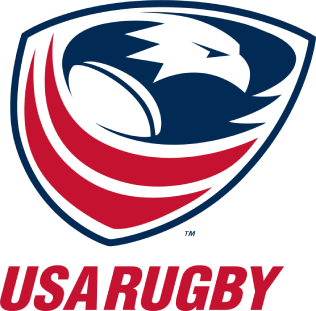
The United States men's national rugby union team, nicknamed the Eagles, represents the United States of America Rugby Football Union in men's international rugby union. USA Rugby is the national governing body for the sport of rugby union in the United States, and is a member of Rugby Americas North, one of six regional governing bodies under World Rugby. Until rugby returned to Olympic competition, with sevens at the 2016 Rio Games, the United States was the reigning Olympic rugby champion, having defeated the one other competitor in 1920 and the two other competitors at the 1924 Summer Olympics.

Daniel William Carter is a New Zealand retired rugby union player.

Warren David Gatland is a New Zealand rugby union coach and former player who is the head coach of the Wales national team.
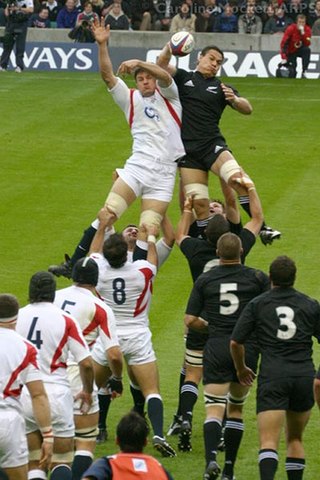
Rugby union has been played in New Zealand since 1870 and is the most popular sport in the country as well as being its national sport.

Jerome Kaino is a former New Zealand rugby union player.

The National Rugby Union teams of France and New Zealand have been playing each other for over a century. The first encounter, during the historic 1905–1906 All Blacks tour of Europe and North America, which was also France's first Test, took place in Paris in January 1906 and was won by New Zealand 38–8. It was not until their third meeting, in 1954, that France secured their first win over New Zealand 3-0.
In June 2013, France played a three-test series against New Zealand as part of the 2013 mid-year rugby test series. This was the sides' first encounter since they met in the 2011 Rugby World Cup final, which New Zealand won 8–7. It was France's first test series against the All Blacks since their 2009 two-test tour of New Zealand, which ended in a 1–1 draw.
The History of the South Africa national rugby union team dates back to 1891, when the British Lions first toured South Africa where they played against South African representative sides. The South Africa national rugby union team played few international matches during a period of international sanctions due to apartheid. Since the end of apartheid in 1994, South Africa has once again fully participated in international rugby.

The History of the Argentina national rugby union team starts with the first international played by an Argentine side against the British Isles in 1910 when they toured on South America. Argentina gained recognition in 1965, when the team toured South Africa playing a series of friendly matches there. In that tour the national team was nicknamed Los Pumas, a name that became an identity mark for Argentina, remaining to present days.
















